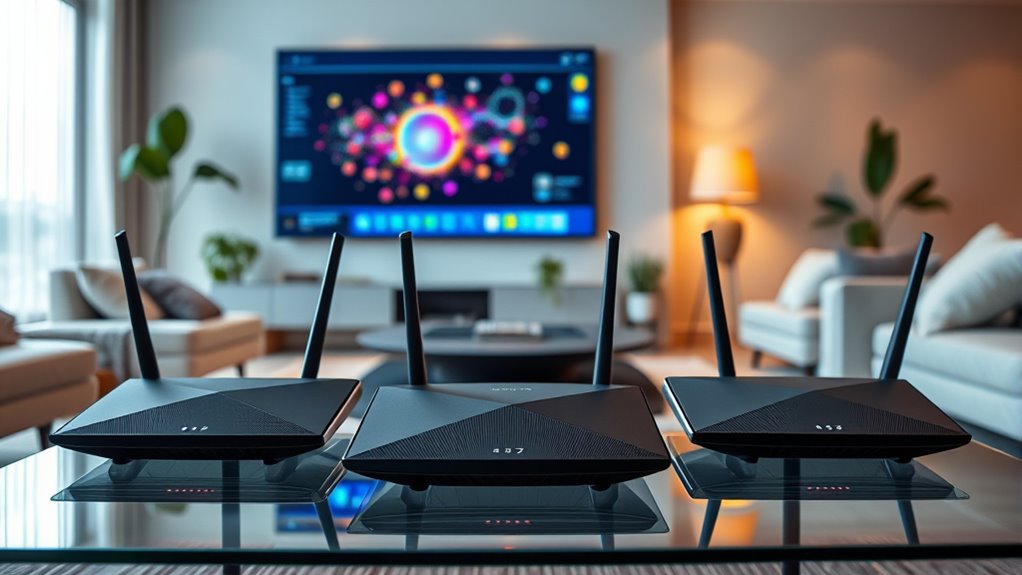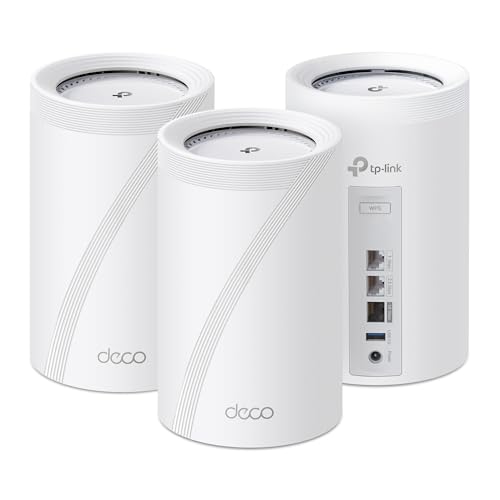If you’re searching for the 15 best Wi-Fi 7 mesh routers of 2025, I’ve reviewed top options like the TP-Link Deco BE25, eero 7, and NETGEAR Orbi 370, all offering ultra-fast speeds, extensive coverage, and future-proof features. These models support high device capacity, easy setup, and advanced security, making them ideal for large homes and demanding users. Keep exploring to discover the best choice for your needs and how they stand out in 2025.
Key Takeaways
- Top Wi-Fi 7 mesh routers in 2025 offer multi-gigabit speeds up to 11 Gbps with advanced multi-link and MU-MIMO technology.
- They provide extensive coverage up to 8,100 sq. ft. and support over 150 devices for large homes and smart setups.
- The best models feature easy app-based setup, seamless mesh expansion, and robust security features like WPA3 encryption.
- High-performance antennas, beamforming, and Wired backhaul options ensure reliable, high-speed connectivity across multiple rooms.
- Price points vary based on features, with premium options offering future-proofing, enhanced security, and compatibility with latest smart home devices.
TP-Link Deco BE25 Dual-Band WiFi 7 Mesh System (3-Pack)
If you’re looking to future-proof your home Wi-Fi, the TP-Link Deco BE25 Dual-Band WiFi 7 Mesh System is an excellent choice, especially for those with large spaces or multiple devices. It delivers fast speeds up to 5 Gbps across multiple streams, supporting the latest WiFi 7 devices like iPhones and gaming consoles. Covering up to 6,600 sq. ft., it handles over 150 devices seamlessly. The system offers wired and wireless backhaul, AI-Roaming for smooth connectivity, and advanced security features. With voice control support and a 3-pack option, it’s perfect for creating a reliable, secure, and smart home network.
Best For: households with large spaces, multiple devices, and a need for fast, reliable WiFi connectivity supporting the latest WiFi 7 technology.
Pros:
- Supports ultra-fast speeds up to 5 Gbps with WiFi 7 and multiple streams.
- Covers up to 6,600 sq. ft. and supports over 150 devices without performance drops.
- Features wired and wireless backhaul, AI-Roaming, and advanced security options for a seamless and secure smart home network.
Cons:
- Requires a modem for ISP compatibility, which may add to setup cost.
- May be more expensive than traditional WiFi systems due to advanced features.
- Setup and management might be complex for users unfamiliar with mesh networking technology.
Amazon eero 7 Dual-Band Mesh Wi-Fi 7 Router (2-Pack)
The Amazon eero 7 Dual-Band Mesh Wi-Fi 7 Router (2-Pack) is an excellent choice for households seeking reliable, high-speed internet coverage across a large area. Supporting plans up to 2.5 Gbps and covering up to 4,000 sq. ft., this affordable mesh system minimizes dead spots and guarantees fast, stable Wi-Fi in every room. It supports over 120 devices, features Wi-Fi 7 innovations like multi-link operation, and is backward compatible with previous eero models. Easy to set up via the eero app, it includes two auto-sensing 2.5 GbE ports, a USB-C port, and a three-year warranty, making it a future-proof solution for busy homes.
Best For: households and small businesses seeking reliable, high-speed Wi-Fi coverage over large areas with support for multiple devices and future-proof technology.
Pros:
- Supports internet plans up to 2.5 Gbps and covers up to 4,000 sq. ft. with two units, reducing dead spots.
- Incorporates advanced Wi-Fi 7 features like multi-link operation and TrueMesh for optimal performance and stability.
- Easy setup via the eero app, backward compatible with previous models, and includes a three-year warranty.
Cons:
- Requires compatible internet service plans and devices for maximum performance.
- The initial cost may be higher compared to traditional Wi-Fi routers.
- Some advanced features like Zigbee and Matter are controller-only and may require additional setup.
Amazon eero 7 Mesh Wi-Fi 7 Router (3-Pack)
For those seeking a reliable, future-proof mesh Wi-Fi system that can handle high-speed internet plans up to 2.5 Gbps, the Amazon eero 7 Mesh Wi-Fi 7 Router (3-Pack) stands out as an excellent choice. It supports Wi-Fi 7 with multi-link operation, delivering wireless speeds up to 1.8 Gbps and covering up to 6,000 sq. ft. across three units. Equipped with dual-band radios, MU-MIMO, and a powerful 1.1 GHz quad-core processor, it guarantees fast, stable connections throughout your home. Backward compatible with previous eero models and integrated with eero Built-in, it offers enhanced security, easy management via the app, and a three-year warranty for peace of mind.
Best For: those seeking a high-performance, future-proof mesh Wi-Fi system capable of supporting internet plans up to 2.5 Gbps with extensive coverage and reliable connections throughout large homes.
Pros:
- Supports Wi-Fi 7 with multi-link operation and speeds up to 1.8 Gbps, ensuring fast wireless performance.
- Covers up to 6,000 sq. ft. with a 3-pack setup, ideal for large households.
- Backward compatible with previous eero models and includes a three-year warranty for added peace of mind.
Cons:
- Requires compatible internet plans and devices to fully utilize Wi-Fi 7 capabilities.
- May be more expensive compared to older Wi-Fi 6 mesh systems.
- Setup and management rely on the eero app, which may not appeal to users preferring traditional router interfaces.
NETGEAR Orbi 370 Series Mesh WiFi 7 System (RBE373)
The NETGEAR Orbi 370 Series Mesh WiFi 7 System (RBE373) stands out as an ideal choice for large households seeking robust and fast Wi-Fi coverage. It leverages WiFi 7 technology, delivering speeds up to 5 Gbps—1.7 times faster than WiFi 6—ensuring seamless streaming, gaming, and video calls. Covering up to 6,000 sq.ft. and supporting up to 70 devices, it maintains strong signals with high-performance antennas. The system includes a router and two extenders for a reliable mesh network, easily set up via the Orbi app. Built-in security features like NETGEAR Armor protect your network from threats, making it a holistic solution.
Best For: households requiring extensive, high-speed Wi-Fi coverage to support multiple devices simultaneously with seamless streaming, gaming, and smart home connectivity.
Pros:
- Utilizes WiFi 7 technology delivering speeds up to 5 Gbps for fast, reliable connections
- Covers up to 6,000 sq.ft. and supports up to 70 devices, ideal for large homes
- Includes a mesh system with a router and two extenders for seamless coverage and easy setup via the Orbi app
Cons:
- Higher price point compared to traditional Wi-Fi 6 or Wi-Fi 5 routers
- May be overkill for small households or those with minimal internet needs
- Requires compatible devices to fully utilize WiFi 7 speeds
Amazon eero 7 Dual-Band Mesh Wi-Fi 7 Router
If you’re looking for a reliable mesh router that seamlessly combines speed and coverage, the Amazon eero 7 Dual-Band Mesh Wi-Fi 7 Router stands out. It supports internet plans up to 2.5 Gbps and covers roughly 2,000 square feet with a single unit. Fully backward compatible with previous eero models, it’s easy to integrate into existing networks. With Wi-Fi 7 technology, it offers wireless speeds up to 1.8 Gbps and supports over 120 devices simultaneously. The router features patented TrueMesh software for stability, and expanding your network is simple with additional eero units. Plus, it comes with a three-year warranty and dedicated support.
Best For: households or small offices seeking fast, reliable Wi-Fi coverage with easy expandability and support for multiple devices.
Pros:
- Supports internet speeds up to 2.5 Gbps and wireless speeds up to 1.8 Gbps for fast connectivity
- Covers up to 2,000 sq. ft. and supports over 120 devices simultaneously
- Fully backward compatible with previous eero models and easy to expand with additional units
Cons:
- May be more expensive than basic routers without mesh capabilities
- Limited to about 2,000 sq. ft. coverage per unit, requiring additional units for larger spaces
- Requires compatible devices to fully utilize Wi-Fi 7 features and maximum speeds
Amazon eero Pro 7 Mesh Wi-Fi 7 Router (3-Pack)
With support for internet plans up to 5 Gbps and coverage of up to 6,000 square feet with a 3-pack setup, the Amazon eero Pro 7 Mesh Wi-Fi 7 Router is an excellent choice for households or small businesses seeking reliable, high-speed connectivity across multiple floors and rooms. Its tri-band Wi-Fi 7 technology delivers wireless throughput up to 3.9 Gbps and features like multi-link operation (MLO) boost speed and stability. Compatible with over 600 devices and supporting seamless expansion, it also offers advanced security, parental controls, and a three-year warranty. Overall, it’s a powerful, flexible solution for demanding network environments.
Best For: households and small to medium-sized businesses seeking high-speed, reliable Wi-Fi coverage across multiple floors and rooms with support for numerous devices.
Pros:
- Supports internet plans up to 5 Gbps and covers up to 6,000 sq. ft. with a 3-pack setup
- Tri-band Wi-Fi 7 technology with speeds up to 3.9 Gbps and multi-link operation for enhanced stability
- Compatible with over 600 devices and integrates seamlessly with existing eero products
Cons:
- Premium price point may be a consideration for budget-conscious users
- Requires a compatible internet plan to maximize performance potential
- Setup and configuration may be complex for users unfamiliar with mesh networks
TP-Link Deco BE25 Dual-Band WiFi 7 Mesh Router (1-Pack)
For those seeking a reliable, high-speed mesh Wi-Fi solution that can cover large homes and support multiple devices, the TP-Link Deco BE25 Dual-Band WiFi 7 Mesh Router stands out. It leverages WiFi 7 technology, offering speeds up to 5 Gbps and supporting over 150 devices simultaneously. With 4 high-gain antennas and advanced features like Multi-Link Operation and seamless AI-Roaming, it ensures stable, fast coverage across 2,600 square feet. The router also provides wired backhaul options with dual 2.5 Gbps ports, robust security via HomeShield, and compatibility with other Deco systems, making it ideal for demanding, multi-device environments.
Best For: homeowners and tech enthusiasts seeking a high-performance, large-area mesh Wi-Fi 7 system capable of supporting numerous devices with fast, stable internet connections.
Pros:
- Supports WiFi 7 with speeds up to 5 Gbps and over 150 devices simultaneously
- Covers large areas up to 2,600 sq. ft. with high-gain antennas and advanced features like Multi-Link Operation and AI-Roaming
- Offers flexible wired backhaul with dual 2.5 Gbps ports and comprehensive security with HomeShield
Cons:
- Requires a modem for internet connection, which may add to setup complexity
- Higher price point compared to previous WiFi standards routers
- May be overkill for smaller homes or less demanding internet needs
TP-Link Deco BE23 3-Pack WiFi 7 Mesh System
The TP-Link Deco BE23 3-Pack WiFi 7 Mesh System stands out as an excellent choice for households demanding fast, reliable coverage across large spaces. Supporting dual-band, 4-stream technology with speeds up to 3.6 Gbps, it covers up to 6,500 sq. ft and supports over 150 devices simultaneously. Equipped with Multi-Link Operation, beamforming, OFDMA, and advanced security features like WPA3 and HomeShield, it guarantees smooth streaming, gaming, and browsing. With wired 2.5 Gbps backhaul ports on each unit, the system offers robust, high-speed connections. Its seamless mesh design, easy management via the Deco app, and compatibility with smart home devices make it a top-tier choice for modern homes.
Best For: households seeking high-speed, reliable Wi-Fi coverage across large areas with multiple devices and smart home integration.
Pros:
- Supports Wi-Fi 7 with speeds up to 3.6 Gbps and coverage up to 6,500 sq. ft.
- Equipped with advanced features like Multi-Link Operation, beamforming, OFDMA, and WPA3 security.
- Easy to manage via the Deco app with seamless mesh connectivity and compatibility with smart home devices.
Cons:
- May be more expensive compared to older Wi-Fi systems due to advanced technology.
- First available date listed as January 7, 2025, which may be a typo or a future release; actual availability could be delayed.
- Requires multiple units for optimal coverage, which could be more costly and complex to set up than simpler systems.
NETGEAR Orbi 370 Series WiFi 7 Mesh System with Router and Extender
If you’re looking for a mesh system that delivers ultra-fast WiFi speeds and robust coverage for a large home, the NETGEAR Orbi 370 Series WiFi 7 Mesh System is an excellent choice. It includes a dual-band WiFi 7 router and extender, supporting speeds up to 5 Gbps—1.7 times faster than WiFi 6. Covering up to 4,000 sq.ft. and supporting 70 devices simultaneously, it guarantees reliable performance across multiple gadgets. Its high-performance antennas provide 360° coverage, and wired options with 2.5 Gig ports deliver ultra-fast internet. Easy to set up via the Orbi app, it also offers advanced security features, including NETGEAR Armor for enhanced online safety.
Best For: households requiring ultra-fast WiFi, extensive coverage, and support for multiple devices in large homes.
Pros:
- Supports WiFi 7 with speeds up to 5 Gbps, ensuring fast performance.
- Covers up to 4,000 sq.ft. and supports 70 devices simultaneously for reliable connectivity.
- Easy to set up and manage via the Orbi app, with built-in security features like NETGEAR Armor.
Cons:
- Designed primarily for use in the U.S., which may limit compatibility elsewhere.
- Requires a separate cable modem for internet connection, adding to setup complexity.
- High-performance features and security may come with a higher price point compared to basic systems.
TP-Link Deco BE63 Tri-Band WiFi 7 Mesh System
The TP-Link Deco BE63 Tri-Band WiFi 7 Mesh System stands out for those seeking ultra-fast, reliable coverage across large homes. It leverages cutting-edge Wi-Fi 7 technology, delivering speeds up to 5188 Mbps on 6GHz, 4324 Mbps on 5GHz, and 574 Mbps on 2.4GHz. With support for over 200 devices across 3,000 sq.ft., it guarantees seamless high-speed connectivity. The system features AI-Roaming for smooth device switching, dual wireless and wired backhaul, and four 2.5G LAN/WAN ports. Plus, it offers advanced security with TP-Link HomeShield, easy management through the Deco App, and compatibility with Alexa and Google Assistant.
Best For: households or small to large homes needing ultra-fast, reliable Wi-Fi coverage with support for numerous devices and seamless device switching.
Pros:
- Utilizes advanced Wi-Fi 7 technology for high-speed, future-proof performance
- Supports over 200 devices with extensive coverage up to 3,000 sq.ft.
- Features AI-Roaming and dual backhaul for seamless connectivity and broad coverage
Cons:
- May be more expensive than standard Wi-Fi 6 systems due to advanced features
- Requires a modem for most ISP setups, adding setup complexity
- Advanced security features like HomeShield might require subscription for full access
TP-Link Deco BE67 Tri-Band WiFi 7 Mesh System (3-Pack)
For anyone seeking a robust, future-proof mesh Wi-Fi system, the TP-Link Deco BE67 Tri-Band WiFi 7 Mesh System (3-Pack) stands out with its impressive 8,100 square feet coverage and support for over 200 devices. It leverages WiFi 7 technology with 8 streams, delivering up to 14 Gbps combined speeds. This means smooth 4K/8K streaming, immersive AR/VR gaming, and fast downloads. The system features Multi-Link Operation, Multi-RUs, and 4K-QAM for peak performance. With multi-gigabit wired ports, a 10 Gbps wired backhaul, and AI Roaming, it ensures seamless, high-speed connectivity across large homes or offices.
Best For: those seeking a high-performance, future-proof mesh WiFi system capable of supporting large homes and numerous devices with ultra-fast speeds.
Pros:
- Supports WiFi 7 with up to 14 Gbps speeds and 8 streams for optimal performance
- Covers up to 8,100 sq. ft. and supports over 200 devices seamlessly
- Features multi-gigabit wired ports and 10 Gbps wired backhaul for high stability
Cons:
- Higher price point compared to older WiFi systems
- Requires compatible WiFi 7 devices to fully utilize advanced features
- Setup and management may be complex for non-technical users
Amazon eero Max 7 Mesh Wi-Fi Router
The Amazon eero Max 7 Mesh Wi-Fi Router stands out with its support for internet plans up to 10 Gbps and advanced Wi-Fi 7 technology, making it an excellent choice for users who demand ultra-fast, reliable connectivity across large spaces. It covers up to 2,500 sq. ft. and connects over 250 devices, perfect for busy households or small offices. With wired speeds reaching 9.4 Gbps via two 10 Gigabit Ethernet ports and wireless speeds up to 4.3 Gbps, it offers high performance and low latency. Its TrueMesh network intelligently finds ideal data paths, ensuring consistent, interference-free internet for gaming, streaming, or smart home devices.
Best For: households or small offices requiring ultra-fast, reliable Wi-Fi coverage over large areas with support for numerous connected devices.
Pros:
- Supports internet plans up to 10 Gbps with Wi-Fi 7 technology for maximum speed and efficiency
- Covers up to 2,500 sq. ft. and connects over 250 devices, ideal for busy households or small businesses
- Features TrueMesh network intelligence for dynamic, interference-free, and reliable connectivity
Cons:
- Higher price point compared to standard routers due to advanced features and technology
- Requires the eero app for setup and management, which may be a learning curve for some users
- Limited to a 3-year warranty, which is industry-leading but shorter than some competitors’ extended options
NETGEAR Orbi 770 Series Tri-Band WiFi 7 Mesh Network System
If you need a high-performance mesh system capable of supporting numerous devices and demanding online activities, the NETGEAR Orbi 770 Series Tri-Band WiFi 7 Mesh Network System is an excellent choice. It delivers blazing speeds up to 11Gbps, covering up to 5,500 sq.ft. with a router and satellite, supporting up to 100 devices. Its tri-band technology with Enhanced Backhaul guarantees fast, reliable WiFi across your home. Setup is straightforward via the Orbi app, and security features like NETGEAR Armor safeguard your network. With multiple wired ports and a sleek design, it’s perfect for gaming, streaming, and smart home integration.
Best For: households and individuals requiring ultra-fast, reliable WiFi coverage for multiple devices, gaming, streaming, and smart home integration.
Pros:
- Supports speeds up to 11Gbps with WiFi 7 technology for seamless high-bandwidth activities.
- Covers up to 5,500 sq.ft. and supports up to 100 devices, ideal for large homes or busy environments.
- Easy setup and management via the Orbi app, with robust security features including NETGEAR Armor.
Cons:
- Higher price point compared to basic mesh systems, which may be a consideration for budget-conscious buyers.
- Large size and weight may require strategic placement for optimal coverage.
- Advanced features and settings might be overwhelming for users unfamiliar with networking technology.
TP-Link Dual-Band Wi-Fi 7 Router Archer BE230
The TP-Link Archer BE230 stands out as an excellent choice for those seeking high-speed, seamless Wi-Fi 7 connectivity across their entire home. Powered by Wi-Fi 7, it supports Multi-Link Operation, Multi-RUs, and 4K-QAM, boosting data capacity by 120%. With speeds reaching up to 3.6 Gbps—2882 Mbps on 5 GHz and 688 Mbps on 2.4 GHz—it handles streaming, gaming, and downloads effortlessly. Equipped with a 2.0 GHz Quad-Core Processor, four external antennas with beamforming, and EasyMesh support, it offers robust coverage and reliable performance. Plus, features like TP-Link HomeShield and app management make it secure and easy to control.
Best For: households and gamers seeking ultra-fast, reliable Wi-Fi 7 coverage with seamless connectivity and advanced security features.
Pros:
- Supports Wi-Fi 7 technology with speeds up to 3.6 Gbps for optimal performance
- Equipped with four external antennas and beamforming for enhanced coverage and signal strength
- Features TP-Link HomeShield for comprehensive network security and parental controls
Cons:
- Requires a compatible modem for internet connection, which may add to setup complexity
- May be overkill for users with basic internet needs or smaller homes
- Limited detailed specifications on device compatibility with all mesh extenders or routers
TP-Link Tri-Band WiFi 7 Router (Archer BE550)
For those seeking a powerful and future-proof Wi-Fi solution, the TP-Link Archer BE550 stands out with its Tri-Band Wi-Fi 7 technology and multi-link operation, delivering blazing-fast speeds up to 5760 Mbps on the 6 GHz band. Equipped with six internal antennas and Beamforming, it optimizes signal strength, capacity, and reliability for seamless 4K/8K streaming, gaming, and downloads. It covers up to 2,000 sq ft and supports EasyMesh, enabling easy expansion with extenders and other devices. With high-speed wired ports, advanced security features like TP-Link HomeShield, and compatibility with smart home assistants, it’s a versatile, future-ready choice for demanding homes.
Best For: households and tech enthusiasts seeking a high-performance, future-proof Wi-Fi 7 router capable of supporting multiple devices, 4K/8K streaming, gaming, and smart home integration.
Pros:
- Delivers ultra-fast Wi-Fi speeds up to 5760 Mbps on the 6 GHz band for seamless high-bandwidth activities.
- Supports EasyMesh for easy expansion and broad home coverage up to 2,000 sq ft.
- Equipped with multiple wired ports and advanced security features like TP-Link HomeShield for comprehensive protection.
Cons:
- Requires compatible devices to fully utilize Wi-Fi 7 capabilities.
- May be more expensive compared to dual-band or older Wi-Fi routers.
- Setup and management might be complex for non-technical users without assistance.
Factors to Consider When Choosing a Wi-Fi 7 Mesh Router Review

When choosing a Wi-Fi 7 mesh router, I focus on your speed and bandwidth needs to guarantee your network can handle everything from streaming to gaming. I also consider coverage area and placement to eliminate dead spots, along with device compatibility and security features for peace of mind. Finally, I look at wired versus wireless backhaul options to optimize performance based on your home setup.
Speed and Bandwidth Needs
To choose a Wi-Fi 7 mesh router that meets your speed and bandwidth needs, you need to start by evaluating your current internet plan’s maximum speed. This helps guarantee the router can fully utilize your bandwidth without creating bottlenecks. Next, consider how many devices will connect simultaneously; a router with robust multi-stream and MU-MIMO capabilities can handle multiple connections smoothly. Think about your online activities—if you stream 4K videos, game, or transfer large files, you’ll need higher throughput. Also, check the router’s supported channels and advanced modulation schemes like 4K-QAM to maximize performance. Lastly, think ahead about future upgrades, confirming your router can handle increased internet speeds down the line. Balancing these factors guarantees peak speed and bandwidth for your needs.
Coverage and Placement Strategies
Choosing the right placement for your Wi-Fi 7 mesh router is crucial to achieving maximum coverage. I recommend evaluating your home’s size and selecting a mesh system that matches or exceeds that area to avoid dead zones. Position your mesh nodes centrally and at ideal heights for even signal distribution and reduced interference. In larger spaces, using multiple nodes ensures seamless coverage, but each should stay within range of another to maintain connectivity. Be mindful of obstructions like thick walls, metal objects, or electronic devices that can weaken signals. It’s also a good idea to regularly review your signal strength in different areas and adjust node placement as needed. Proper placement maximizes performance and ensures reliable Wi-Fi throughout your home.
Compatibility With Devices
Ensuring your Wi-Fi 7 mesh router is compatible with your devices is essential for a smooth and reliable home network. I look for routers that support the latest Wi-Fi standards, including multi-link operation (MLO) and multi-RUs, to guarantee future-proofing and maximum compatibility with new devices. It’s also important that the router is backward compatible with earlier Wi-Fi generations like a/b/g/n/ac/ax, so my existing gadgets still work seamlessly. I verify if the router supports the channels and bandwidths used by my devices, such as 320 MHz channels for high-speed gaming and streaming. Additionally, I check its capacity to handle the number of connected devices without performance drops. Compatibility with smart home systems and voice assistants like Alexa or Google Assistant is a bonus for integrated control.
Security and Privacy Features
A Wi-Fi 7 mesh router’s security features play a crucial role in safeguarding your home network and connected devices. I look for routers that support advanced protocols like WPA3 encryption, which offers stronger data protection and prevents unauthorized access. Built-in security tools such as network scanning, IoT device protection, and parental controls give me peace of mind, ensuring all devices are safe. VPN client and server support is essential for secure remote access without extra software. I also prioritize routers that receive regular firmware updates, addressing vulnerabilities proactively. Extensive security management, including real-time alerts, detailed reports, and customizable access controls, helps me maintain control and monitor my network effectively. These features are essential for keeping my digital life secure.
Wired Vs Wireless Backhaul
When selecting a Wi-Fi 7 mesh router, understanding the differences between wired and wireless backhaul is essential, as it directly affects network stability and performance. Wired backhaul uses Ethernet cables to connect mesh nodes, offering more stable, higher bandwidth links, lower latency, and consistent speeds—perfect for gaming and 4K streaming. Wireless backhaul relies on Wi-Fi signals, which can be affected by interference, distance, and physical barriers, potentially reducing overall performance. It simplifies setup and allows flexible placement, making it ideal for larger spaces or environments where running cables is impractical. However, it may struggle with scalability and reliability under high demand. Your choice depends on your priorities: performance and stability favor wired backhaul, while convenience and flexibility lean toward wireless.
Ease of Setup
Have you ever struggled with setting up a new Wi-Fi mesh system? It can be frustrating, but good routers make it easier. Look for models that support quick, straightforward setup processes, ideally with step-by-step guidance via a mobile app or web interface. Wireless mesh systems that automatically detect devices and simplify network configuration help reduce the initial hassle. Compatibility with your existing modem and internet provider guarantees a smooth integration without extra hardware or software headaches. Features like QR code scanning or guided setup wizards can speed things up and minimize mistakes. Additionally, extensive documentation and responsive customer support are invaluable, especially if you encounter issues. Choosing a router with these features helps you get online quickly and with minimal stress.
Future-Proofing Capabilities
To guarantee your Wi-Fi 7 mesh router remains relevant for years to come, it’s vital to look for features that support future technology advancements. Support for multi-gigabit speeds, like 5 Gbps or higher, ensures your network can handle increasing internet demands. Compatibility with upcoming Wi-Fi 7 features such as Multi-Link Operation (MLO) and 320 MHz channels prepares your system for faster, more efficient data transfers. Advanced security protocols and robust network management maintain safety as technology evolves. Additionally, a high device capacity and seamless roaming future-proof your setup against the growing number of connected devices. Finally, quality hardware components and scalable architecture make upgrades simple, preventing obsolescence and keeping your network ready for the innovations ahead.
Frequently Asked Questions
How Does Wi-Fi 7 Improve Network Security Features?
Wi-Fi 7 substantially boosts network security by implementing advanced encryption protocols like WPA3, making it harder for hackers to access data. It also introduces improved firmware security, automatic updates, and enhanced device authentication methods to protect your network. I find that these features give me peace of mind, knowing my connection is safer from cyber threats. Overall, Wi-Fi 7 offers a more robust and secure wireless experience for my home or office.
Can Wi-Fi 7 Mesh Routers Prioritize Bandwidth for Specific Devices?
Yes, Wi-Fi 7 mesh routers can prioritize bandwidth for specific devices. They use advanced Quality of Service (QoS) features that let me assign higher priority to devices like my laptop or streaming device. This guarantees smoother performance where I need it most, reducing lag and buffering. It’s a game-changer for managing my network efficiently, especially with multiple devices competing for bandwidth.
What Is the Typical Lifespan of a Wi-Fi 7 Mesh Router?
I’ve found that Wi-Fi 7 mesh routers typically last around 5 to 7 years. Imagine setting up your network, feeling confident it’ll serve you well for years to come—then watching as firmware updates and hardware improvements extend their life span. While technology evolves fast, these routers are designed for durability, giving you reliable performance for quite some time before needing an upgrade.
Are Wi-Fi 7 Mesh Systems Compatible With Existing Wi-Fi 6 Devices?
Yes, Wi-Fi 7 mesh systems are compatible with Wi-Fi 6 devices. I’ve found that they seamlessly connect, allowing you to upgrade gradually without losing your existing devices. While Wi-Fi 7 offers faster speeds and improved performance, it’s backward compatible, so your current Wi-Fi 6 gadgets will still work perfectly. This makes upgrading easier and more flexible without needing to replace all your devices at once.
How Do Mesh Routers Handle Firmware Updates Automatically?
Think of firmware updates as a gardener tending to their plants—constant care keeps everything thriving. Mesh routers typically handle updates automatically by checking with the manufacturer’s servers regularly. When a new firmware is available, they download and install it silently, often overnight. This process guarantees your network stays secure and performs at its best without you lifting a finger, letting you enjoy a seamless, worry-free connection.
Conclusion
In the vast ocean of Wi-Fi options, these routers are my trusty ships ready to navigate your digital voyage. Whether you need a small fleet or a mighty armada, each one offers a sturdy foundation for seamless connectivity. Think of them as your digital lighthouse, guiding every device safely through the stormy seas of interference and lag. With the right mesh system, your home’s Wi-Fi becomes a smooth sailing adventure—bright, reliable, and limitless.

























